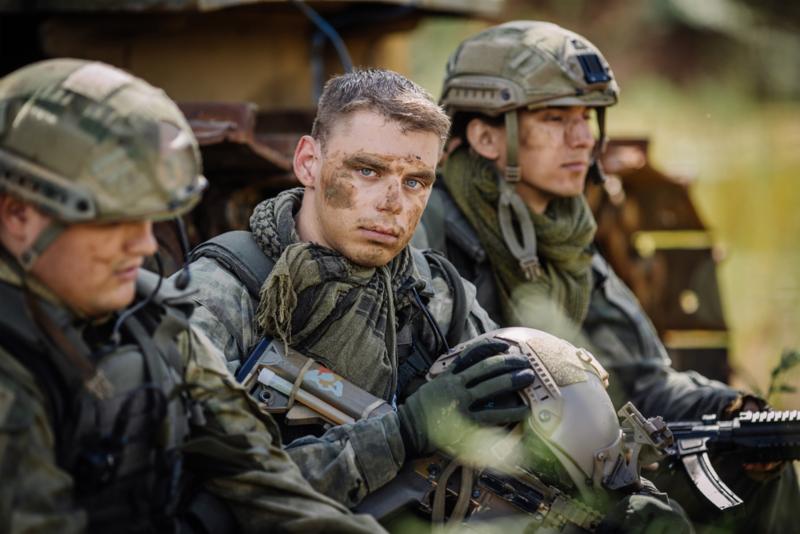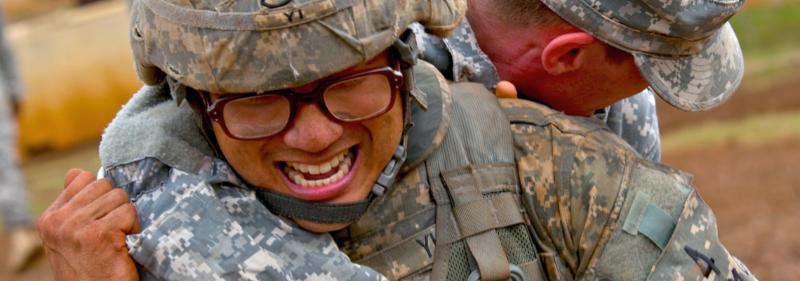Serving Our Veterans Through Innovation
By Christian Braemer
Cofounder & CEO, Benefunder
When we started Benefunder, our main goal was to promote and fund research. Since most of our biggest innovations have their roots in academic labs, it only seemed natural to support our single biggest infrastructure for innovation.
Admittedly, I never really associated academic research as a resource for solving some of the most pressing issues facing our military and veterans - big mistake! This is an area that's near and dear to my heart. As most of you don't know, I was a sergeant/section commander for the 1st infantry division in the Danish Army and have many friends that have and continue to serve in the U.S. Armed Forces.
It wasn't until I met one of our researchers, Dr. Kevin Murphy, (former USN) at UC San Diego, who was conducting a trial for Posttraumatic Stress Disorder (PTSD) and heard from former SEAL team operators who had already benefitted from the treatment, that we started looking into other areas of research affecting veterans.
I later had an opportunity to speak with Maj. Gen. Graham (U.S. Army Retired - see Researcher Spotlight), who heads up the Vets4Warriors program at Rutgers
University. He made me realize the true breadth of the programs for veterans running at our nation's universities.
To my surprise, there are many researchers in this space, so we decided to create a fund.
The Veterans Impact Fund is focused on four core areas: preventative technologies, mental wellness, physical wellness, and adjusting to civilian life.
Our four focus areas are important because they all have potential multiplier effects and are all having a tough time attracting funding.
This means a breakthrough in any of these areas equates to benefits for much larger populations of veterans and even civilians. We are addressing underlying issues that cause undue strains on our systems and infrastructure and that create widespread hardship for veterans and their families.
For example, technologies and methodologies that prevent injuries or even casualties from occurring on the battlefield are pretty obvious, but if we can find a cure for PTSD -- which affects tens of thousands of servicemembers, clogs up the VA, is a leading cause of homelessness, and has torn thousands of families apart -- that would be a major breakthrough.
So would providing support services for active duty and former military in transition, or adjusting to civilian life, such as programs that are currently or could lead to widespread employment of skilled veteran workers.
Likewise for improving treatments and access to medical devices, which reduce suffering and improve quality of life for those who have put their lives on the line for the rest of us.
Our government spends billions of dollars annually in defense-related research through programs like DARPA that have helped us maintain our superiority on the battlefield, increased our capabilities, and improved the safety of our troops in the air, at sea, and on land, which all subsequently leads to enhancing our security and way of life.
Many of those inventions make their way to our everyday lives, eventually in the form of communications, robotics, transportation, medical, and countless other breakthroughs that form entire industries, creating jobs, and boosting our economy.
Our Veterans Impact Fund was designed to provide the same kinds of outcomes -- targeting our heroes as the primary initial beneficiaries, and supported by all of us who are grateful for their sacrifice.
Most of our researchers in this fund will provide benefits that go well beyond veterans, but I can't think of a much better reason to get behind a cause that improves the lives of the men and women who have served.
I hope you'll join us in enhancing the lives of veterans and their families either through supporting the fund or through directly funding any one of the research labs that are focused in this area.
And to those of you who have served, thank you!
|
|
 |
|
Benefunder Veterans Impact Fund
|

Nearly 23 million veterans are living among us today. Proud, accomplished, and loyal, these men and women come home to a world that poses everyday battles many of them never expected. They face both mental and physical health challenges, difficult transitions back into their civilian lives, as well as financial troubles. Benefunder's
Veterans Impact Fund
includes innovators who are creating novel solutions to improve the lives of veterans and their families, as well as active duty service members.
These top researchers are working on novel treatments for PTSD, innovative prosthetics, unmanned robots, 3D printing to heal wounds, remote sensing technologies, and solutions to adjusting to civilian life, just to name a few. Many of these researchers - some vets themselves - are working directly with our veteran community to help give them hope and a better life.
Top innovators include:
Kevin Murphy
, a doctor at the University of California, San Diego, who is successfully using repetitive transcranial magnetic stimulation (rTMS) to treat some of the most severe cases of neuro-dysfunction, including PTSD, depression, and anxiety.
Thomas Bewley
, a former U.S. Air Force pilot and now a mechanical and aerospace engineer at the University of California, San Diego who is developing novel unmanned systems for various operations in urban warfare and homeland/border security to prevent injury.
Susmita Bose
,
a Washington State University engineer who is developing defect-specific implants and infection controlled implants to treat bullet wounds or complicated wounds, as well as using 3D printing to create custom prosthetics.
Andrew Ellington
, a biochemist at the The University of Texas at Austin, who is developing early diagnostic tests that will expedite the delivery of life-saving preventative or secondary care to military personnel in the field.
To learn more about these innovative solutions and others, as well as how you can support our veterans, please visit our
Veterans Impact Fund
.
|
Benefunder Hosts Webinar For Foundations and Grantmakers Focused on Veterans
 Join Benefunder on Friday, November 13 from 10 a.m.- 11 a.m. PST for a special
webinar for foundations and grantmakers focused on veterans.
During the webinar, you will hear from leading researchers solving real veterans issues -- from developing effective treatments for PTSD and traumatic brain injuries, creating better prosthetics, developing solutions for helping veterans transition into civilian life, and designing unmanned vehicles to keep our troops safe.
For more information, please click
here.
|
According to t
he Washington Post
, over 1.4 million veterans feel disconnected from civilian life, while other
statistics
show that over 22 members of the Armed Forces take their lives each day. One major factor that makes it difficult for active duty soldiers and veterans to connect with even their closest loved ones is the detachment they feel in sharing the hardships of training and combat that no civilian truly understands. Moreover, the stigma they face when seeking mental help is often overwhelming.
Mark Graham,
Major General U.S. Army (Retired), is working to solve these problems through Vets4Warriors (V4W), a 24/7 peer support call center based at Rutgers University Behavioral Health Care that helps service members and veterans to connect with life and overcome hardships stemming from PTSD, isolation, loneliness, and depression.
As Graham pointed out, the visible and invisible scars of war do not wear away easily with time. "You never know when this is going to hit them and their families, years later," he said. "This is why an effective, cultural peer support model is critical, to let people know they are not alone at this very moment."
For more information or to support Graham's research and call center, click
here.
|
Benefunder Featured in the Stanford Social Innovation Review

Benefunder cofounder and CEO Christian Braemer recently wrote an editorial for the
Stanford Social Innovation Review that focuses on how novel, targeted investment strategies are giving donors a powerful chance to spend wisely -- by fueling the innovation economy. Read the article
here.
|
CONNECT'S 30TH Anniversary Bash: Benefunder Part of San Diego's Innovation Prowess

The U-T San Diego captured Benefunder CEO Christian Braemer's reflections on how CONNECT has helped fuel innovation and entrepreneurship in San Diego the past three decades during the organization's recent anniversary bash. Read the story here.
|
|
|